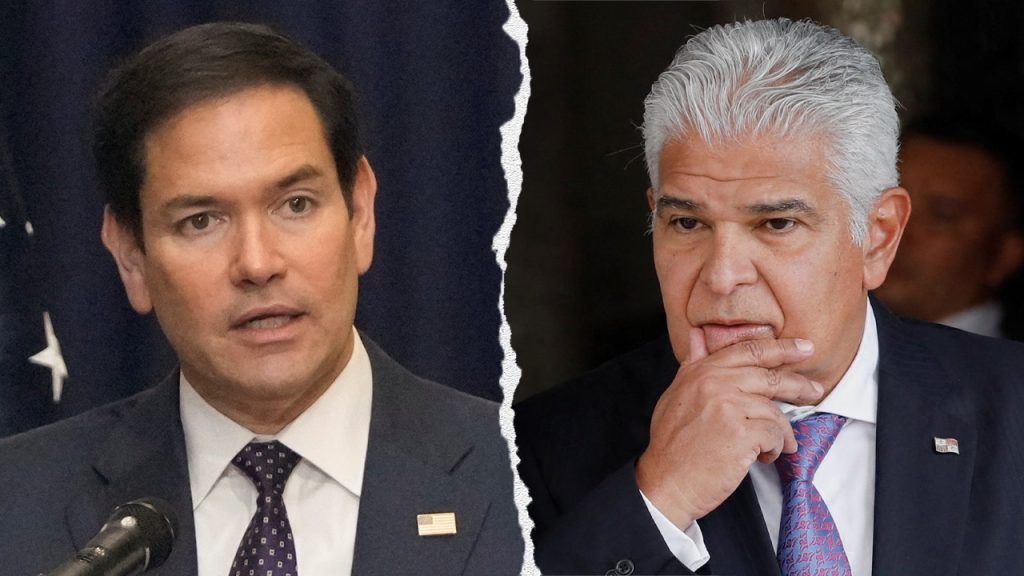Panama’s newly elected President, José Raúl Mulino, embarked on his first international trip, meeting with U.S. Secretary of State Marco Rubio, to address concerns regarding China’s growing influence in Panama, particularly concerning the Panama Canal. Mulino’s discussions with Rubio centered on strengthening the U.S.-Panama relationship and reassuring the U.S. of Panama’s commitment to maintaining its sovereignty over the strategically vital waterway. This visit followed complaints from former President Donald Trump about China’s perceived control over the canal and its alleged imposition of exorbitant fees on U.S. vessels. Mulino aimed to alleviate these concerns and shift Panama’s focus towards increased collaboration with the United States. He declared his intention to terminate a 2017 memorandum of understanding with China related to its Belt and Road Initiative, signaling a pivot away from Chinese investment and towards fostering stronger ties with the U.S.
The backdrop of this meeting was Trump’s persistent assertion that China effectively controls the Panama Canal and exploits its position to levy substantial fees on American shipping. This narrative, coupled with China’s expanding economic footprint in the region, fueled anxieties within the U.S. regarding its strategic interests in the Western Hemisphere. Trump’s calls to reclaim ownership of the canal resonated with some Republican lawmakers, leading to the introduction of a bill, the Panama Canal Repurchase Act, aimed at initiating negotiations with Panama to reacquire the canal. This highlighted the strategic importance of the canal for the U.S., particularly given the significant volume of U.S.-bound or U.S.-originating traffic that transits the waterway.
The Panama Canal, completed by the United States in 1914 and subsequently transferred to Panamanian control during the Carter administration, holds immense geopolitical significance. It serves as a critical maritime shortcut, connecting the Atlantic and Pacific Oceans and significantly reducing travel times for commercial and military vessels. Without access to the canal, ships would be forced to navigate the lengthy and treacherous route around Cape Horn, adding thousands of miles and significant costs to their journeys. This strategic importance underscores the United States’ deep concern about any potential threat to the canal’s operation or access, particularly from a rival power like China.
Rubio’s visit to Panama and meeting with Mulino signified the U.S.’s efforts to reassert its influence in the region and counter China’s growing presence. Beyond the canal issue, the meeting also addressed the ongoing migration crisis in the Western Hemisphere and strategies to ensure fair competition for U.S. companies in the region. Rubio emphasized the U.S.’s commitment to promoting an “America First” foreign policy, suggesting a renewed focus on protecting and advancing U.S. interests in the region. The meeting marked a crucial step in reshaping the U.S.-Panama relationship amidst growing geopolitical competition and anxieties over China’s expanding global influence.
The meeting between Mulino and Rubio symbolized a strategic recalibration in Panama’s foreign policy. By opting to move away from China’s Belt and Road initiative and prioritize closer ties with the U.S., Mulino signaled his intention to balance Panama’s relationships with global powers. This decision reflects the complex geopolitical landscape in which smaller nations often navigate the interests of larger players. Panama’s choice to prioritize its relationship with the U.S., its historical partner in the canal’s construction and operation, underscores the enduring strategic importance of the waterway and the sensitivity surrounding its control.
The discussions surrounding the Panama Canal also highlighted the broader context of U.S.-China competition. The two superpowers are increasingly vying for influence in various regions of the world, and Latin America has become a new arena for this rivalry. China’s growing economic engagement in the region, through infrastructure projects and investments, has raised concerns in Washington about Beijing’s long-term strategic objectives. The U.S. views the Panama Canal as a vital asset for its national security and economic interests, and any perceived threat to its access or control is likely to be met with strong opposition. The meeting between Rubio and Mulino served as a clear signal of the U.S.’s commitment to safeguarding its interests in the region and countering China’s growing influence.

